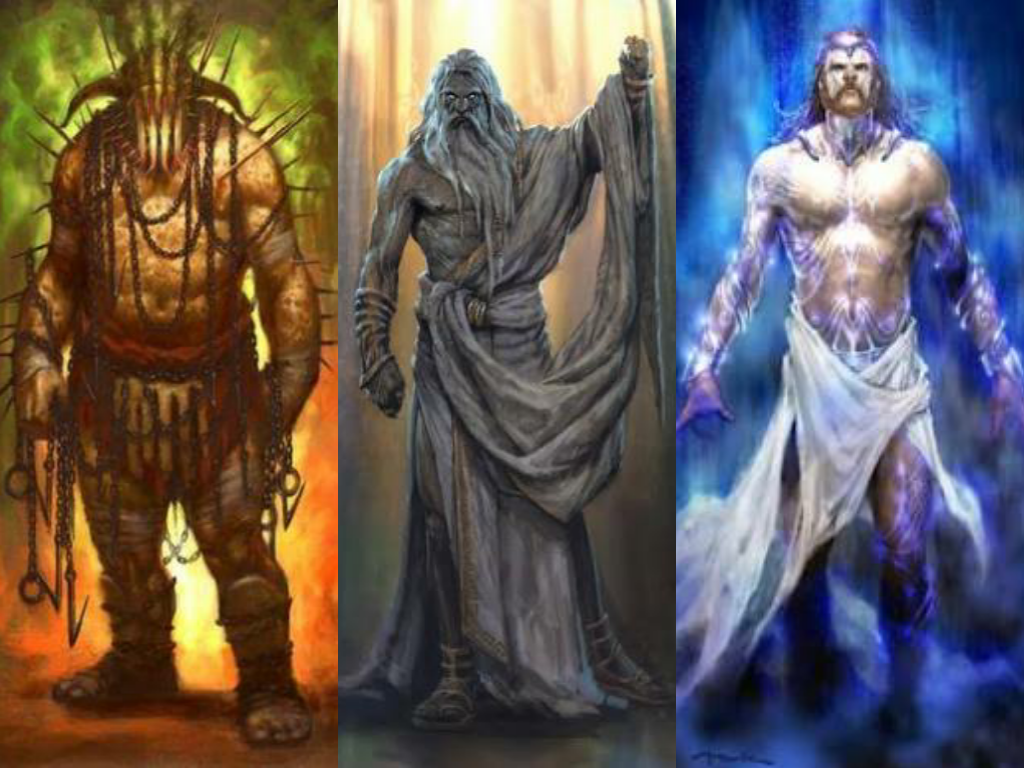
This myth is the most important one Hades takes part in it also connected the Eleusinian Mysteries with the Olympian pantheon, particularly as represented in the Homeric Hymn to Demeter, which is the oldest story of the abduction, most likely dating back to the beginning of the 6th century BC. Hades obtained his wife and queen, Persephone, through abduction at the behest of Zeus. Zeus received the sky, Poseidon received the seas, and Hades received the underworld, the unseen realm to which the souls of the dead go upon leaving the world as well as any and all things beneath the earth. Following their victory, according to a single famous passage in the Iliad ( Book XV, ln.187–93), Hades and his two brothers, Poseidon and Zeus, drew lots for realms to rule. The war lasted for ten years and ended with the victory of the younger gods.

After their release, the six younger gods, along with allies they managed to gather, challenged the elder gods for power in the Titanomachy, a divine war. Upon reaching adulthood, Zeus managed to force his father to disgorge his siblings. Zeus was the youngest child and through the machinations of their mother, Rhea, he was the only one that had escaped this fate. He had three older sisters, Hestia, Demeter, and Hera, as well as a younger brother, Poseidon, all of whom had been swallowed whole by their father as soon as they were born. In Greek mythology, Hades, the god of the Greek underworld, was the first-born son of the Titans Cronus and Rhea.

Pinax with Persephone and Hades Enthroned, 500-450 BC, Greek, Locri Epizephirii, Mannella district, Sanctuary of Persephone, terracotta – Cleveland Museum of Art He was also referred to as Zeus katachthonios (Ζεὺς καταχθόνιος), meaning "the Zeus of the underworld", by those avoiding his actual name, as he had complete control over the underworld. Nicander uses the form Hegesilaus ( Ἡγεσίλαος). Įpithets of Hades include Agesander ( Ἀγήσανδρος) and Agesilaos ( Ἀγεσίλαος), both from ágō ( ἄγω, "lead", "carry" or "fetch") and anḗr ( ἀνήρ, "man") or laos ( λαός, "men" or "people"), describing Hades as the god who carries away all. More elaborate names of the same genre were Ploutodótēs ( Πλουτοδότης) or Ploutodotḗr ( Πλουτοδοτήρ), meaning "giver of wealth". This deity was a mixture of the Greek god Hades and the Eleusinian icon Ploutos, and from this he also received a priestess, which was not previously practiced in Greece. Plouton became the Roman god who both rules the underworld and distributed riches from below. Perhaps from fear of pronouncing his name, around the 5th century BC, the Greeks started referring to Hades as Plouton ( Πλούτων Ploútōn), with a root meaning "wealthy", considering that from the abode below (i.e., the soil) come riches (e.g., fertile crops, metals and so on). Later the iota became silent, then a subscript marking ( ᾍδης), and finally omitted entirely ( Άδης). The name as it came to be known in classical times was Háidēs ( Ἅιδης). Other poetic variations of the name include Aïdōneús ( Ἀϊδωνεύς) and the inflected forms Áïdos ( Ἄϊδος, gen.), Áïdi ( Ἄϊδι, dat.), and Áïda ( Ἄϊδα, acc.), whose reconstructed nominative case * Áïs ( * Ἄϊς) is, however, not attested. In Homeric and Ionic Greek, he was known as Áïdēs. Detail from an Attic red-figure amphora, ca.

Martin Litchfield West argues instead for an original meaning of "the one who presides over meeting up" from the universality of death. The earliest attested form is Aḯdēs ( Ἀΐδης), which lacks the proposed digamma. Modern linguists have proposed the Proto-Greek form * Awides ("unseen").

An extensive section of Plato's dialogue Cratylus is devoted to the etymology of the god's name, in which Socrates is arguing for a folk etymology not from "unseen" but from "his knowledge ( eidenai) of all noble things". The origin of Hades' name is uncertain, but has generally been seen as meaning "the unseen one" since antiquity. Ploútōn), itself a euphemistic title often given to Hades. The Etruscan god Aita and the Roman gods Dis Pater and Orcus were eventually taken as equivalent to Hades and merged into Pluto, a Latinisation of Plouton ( Greek: Πλούτων, translit. In artistic depictions, Hades is typically portrayed holding a bident and wearing his helm with Cerberus, the three-headed guard dog of the underworld, standing to his side. Hades received the underworld, Zeus the sky, and Poseidon the sea, with the solid earth, long the province of Gaia, available to all three concurrently. He and his brothers, Zeus and Poseidon, defeated their father's generation of gods, the Titans, and claimed rulership over the cosmos. Hades was the eldest son of Cronus and Rhea, although this also made him the last son to be regurgitated by his father. Háidēs Ἅιδης, Háidēs), in the ancient Greek religion and myth, is the god of the dead and the king of the underworld, with which his name became synonymous. Hades ( / ˈ h eɪ d iː z/ Greek: ᾍδης, translit.


 0 kommentar(er)
0 kommentar(er)
